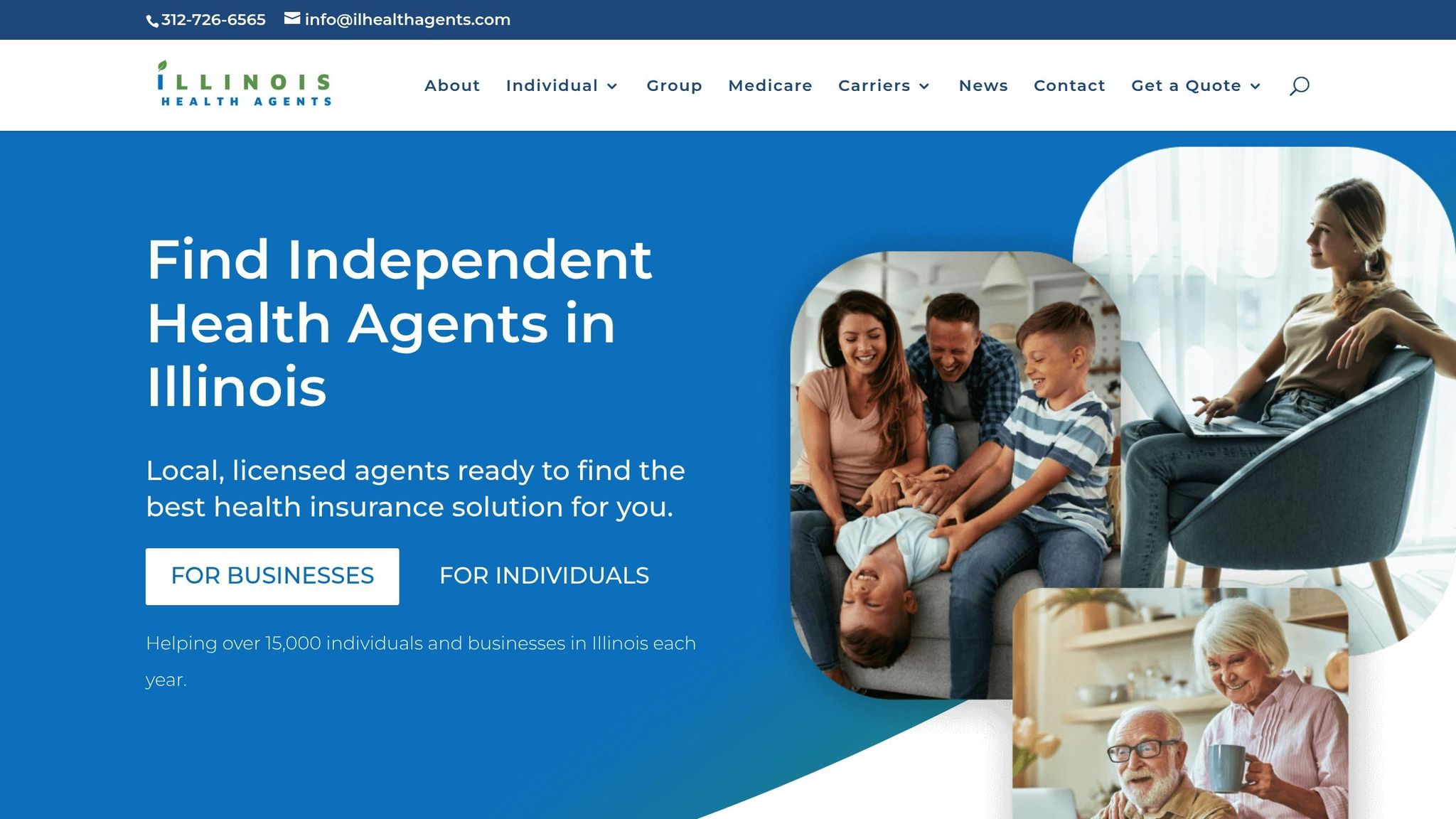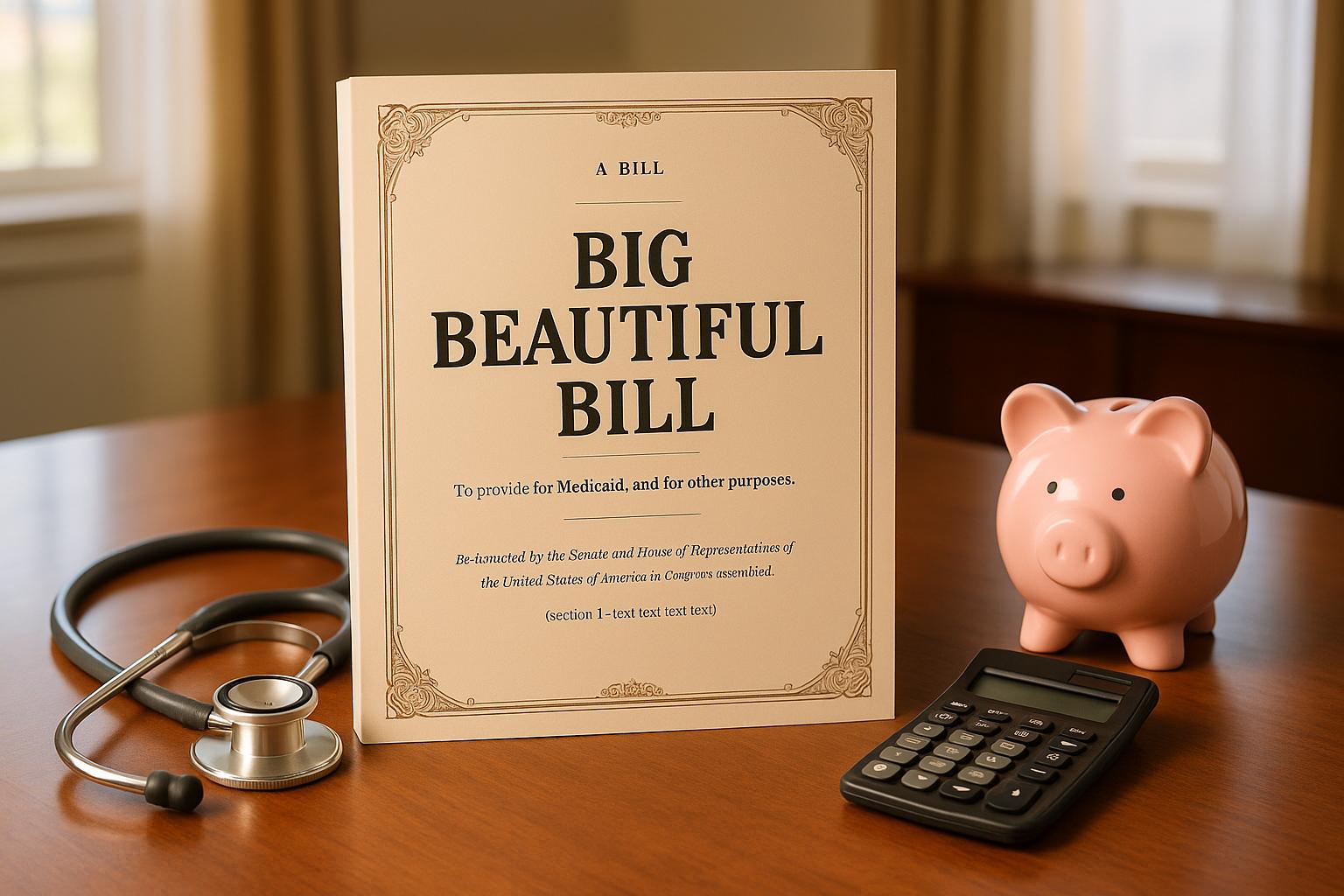The "One Big Beautiful Bill Act" (OBBBA) introduces sweeping changes to Medicaid, Medicare, and the Affordable Care Act (ACA), significantly affecting healthcare access and costs in the U.S., particularly in Illinois. Here’s a quick overview:
- Medicaid Cuts: Federal funding for Medicaid and CHIP is reduced by $1.02 trillion, potentially affecting over 10.5 million people nationwide by 2034.
- Illinois Impact: Up to 330,000 Illinois residents may lose Medicaid coverage, with the state facing a $48 billion reduction in federal Medicaid funds over the next decade.
- New Rules: Adults on Medicaid must meet 80 monthly work/training hours, with stricter eligibility checks happening twice a year.
- Increased Costs: ACA Marketplace families could see annual healthcare costs rise by $1,032 to $1,700, with rural areas hit hardest.
- Healthcare Providers: Nine rural hospitals and over 90 nursing homes in Illinois risk closure due to funding cuts.
The bill’s changes could result in reduced healthcare access, higher costs for families, and financial strain on healthcare systems, especially in vulnerable communities.
How Trump’s "big beautiful bill" could impact your Medicaid coverage
Big Changes in the Large Lovely Bill for Medicaid
The Large Lovely Bill for Medicaid brings three main shifts that will deeply change how Medicaid works in Illinois. These changes are about who can get Medicaid, money from the government, and tough checks.
New Rules on Who Can Get Help
One of the main shifts hits adults in Medicaid from the Affordable Care Act (ACA) boost. To keep their health help, these people – unless free from this rule – must now work, help out, or train for a job for at least 80 hours per month. This rule is for Medicaid folks who do not get in by default through plans like Supplemental Security Income (SSI) or Social Security Disability Insurance (SSDI).
The bill also makes it harder for some immigrant groups to get help but still helps refugees, asylum seekers, hurt traffic victims, and hurt spouses and kids. For those who need care for a long time, the limit on how much a home can be worth drops to $1 million, no matter the rise in costs. This makes it hard for some to get help and keep their homes. Moreover, help for past bills is less – just one month back for ACA people and two months for others. This means if you get sick and ask for Medicaid late, the help will cover less of what you owe from before you asked.
Money Change: Less from the Big Pot, More on State
The way Illinois gets money for Medicaid is also getting less. The share of money from the government for the Medicaid boost drops from 90% to 51%, leaving Illinois with an extra $3.2 billion to pay each year. In 2023, Illinois set about $31 billion for Medicaid, with $20 billion from the big pot. Of this, $8.7 billion helped the ACA boost.
Illinois has a rule that stops the ACA boost if money from the big pot falls under 90%. Governor JB Pritzker talked about how hard this is financially.
"The state of Illinois can’t cover the cost – no state in the country can cover the cost of reinstating that health insurance that is today paid for mostly by the federal government, partly by state government."
The bill sets limits on how states can use money for their Medicaid plans. It cuts down on taxes for healthcare providers and puts a cap on the amount states like Illinois can give to hospitals, setting them to match Medicare limits. Over the next ten years, the money Illinois gets from federal Medicaid is expected to fall by $48 billion, with $6.73 billion less going to places outside big cities. This cut might put 93 nursing homes in the state at risk.
New Checking and Joining Steps
The bill brings in tougher rules for people to keep their Medicaid. Those who joined through the ACA expansion now have to check their status twice a year, not just once. About 772,000 people in Illinois will need to show new proofs, like Death Master File checks, each time they check.
These new steps mean people must keep a close eye on their Medicaid status. If they miss a check date or don’t report their work time, they could lose their coverage. The Illinois Department of Healthcare and Family Services has said if they don’t check again, it might also lead to doctors being cut from the Medicaid plan. Currently, Medicaid helps 3.4 million people, nearly a fourth of everyone in Illinois – these new steps could make things hard for a lot of them. Across the country, the Congressional Budget Office thinks that by 2034, over 10.5 million people could lose Medicaid and CHIP because of these changes.
How the Bill Affects Healthcare Access in Illinois
The Big Beautiful Bill Medicaid is poised to change the healthcare landscape in Illinois, affecting millions of residents and reshaping how people maintain their health coverage.
Expected Changes in Medicaid Enrollment
In Illinois, stricter work rules and more frequent eligibility checks could result in 330,000 Medicaid enrollees – about 11% of the 3.4 million total – losing their coverage. A federal analysis, based on past trends, estimates that up to 17% of Medicaid recipients may be at risk of losing access. This decline in enrollment is expected to happen gradually, with individuals who gained coverage through the Affordable Care Act (ACA) likely facing additional hurdles, such as meeting new work requirements or navigating a more complex verification process.
Nationally, the Congressional Budget Office projects that 5 million Americans could lose Medicaid coverage due to the cuts outlined in the Big Beautiful Bill. These changes will have far-reaching consequences, especially for Illinois’ most vulnerable populations.
Impact on At-Risk Groups
As Medicaid enrollment drops, certain groups will feel the effects more acutely. Currently, children make up 44% of Illinois Medicaid enrollees, seniors account for 9%, and adults with disabilities represent 7%. The new work requirements will also impact 64% of nondisabled working adults, adding to the challenges faced by many working families.
Rural communities are particularly at risk. Cuts to hospital funding could lead to closures in areas where healthcare options are already limited. A.J. Wilhelmi, CEO of the Illinois Health and Hospital Association, highlighted the precarious situation:
"The hospitals in these communities are already on the brink, based on some of the increases in labor, drug and supply costs coming out of COVID, a continuation of claim denials by payers and relatively flat reimbursement rates. So, all of that is creating significant pressures. And when you add these Medicaid cuts to an already challenging situation, we know that there are several hospitals that close because of these changes."
Low-income families will also face new financial challenges. Adults covered under the ACA expansion with incomes above 100% of the federal poverty level will now have to pay cost-sharing fees for most healthcare services. For families already struggling to make ends meet, these additional out-of-pocket costs could make necessary care even harder to afford.
How Illinois’ Trigger Law Applies
Beyond enrollment challenges and rising costs, Illinois-specific policies add another layer of complexity. The state’s 2013 Trigger Law requires ending the Medicaid ACA expansion if the federal funding share drops below 90%. The Big Beautiful Bill includes provisions that could lower the federal matching rate. For states offering coverage to undocumented immigrants, the federal funding rate could drop from 90% to 80%, which would automatically trigger the termination of the ACA expansion in Illinois unless the legislature steps in.
If the Trigger Law is activated, all 772,000 adults enrolled through the ACA expansion could lose their coverage. To continue funding these individuals at the standard 51% Medicaid rate, Illinois would need to allocate an additional $3.2 billion annually.
Elizabeth M. Whitehorn, Director of the Illinois Department of Healthcare and Family Services, summed up the potential fallout:
"The federal Medicaid cuts will be devastating, as they will strip coverage away from many of our current customers, strain providers across the state, diminish funding for critical reproductive healthcare services, and bring major fiscal pressures for the state."
These combined challenges – declining enrollment, disproportionate impacts on at-risk groups, and the potential consequences of the Trigger Law – paint a difficult picture for healthcare access in Illinois as the state works to address the needs of those who remain eligible.
Financial Effects for Illinois Residents and Providers
The Big Beautiful Bill Medicaid brings a significant reshuffling of healthcare costs across federal, state, and local levels, creating ripple effects for families and healthcare providers in Illinois.
Cost Shifts from Federal to State and Local Levels
Illinois is bracing for a $48 billion cut in federal Medicaid funding over the next decade. Currently, the federal government covers 51% of traditional Medicaid costs and 90% of the Affordable Care Act (ACA) expansion costs for the state. However, under the proposed legislation, these contributions are expected to drop, leaving Illinois with tough choices – either reduce services or find new revenue streams.
One major concern is the restriction on provider taxes, which are a key funding source for the state. Illinois collects about $2 billion annually through its hospital tax. Starting in 2028, the new law will gradually lower the tax rate by half a percentage point each year until it hits 3.5% in 2032. This change could strip the state of $4.1 billion in tax revenue and an additional $6 billion in federal matching funds . For rural Illinois, this could mean $6.73 billion in spending cuts, while counties might face higher uncompensated care costs due to coverage losses and increased cost-sharing requirements.
These financial shifts don’t just burden the state budget – they also jeopardize the financial stability of healthcare providers.
Impact on Healthcare Providers and Hospitals
Hospitals in Illinois are already grappling with rising costs for labor, drugs, and supplies in the wake of COVID-19. Adding Medicaid cuts to this mix could push many over the edge. A.J. Wilhelmi, CEO of the Illinois Health and Hospital Association, explained:
"The hospitals in these communities are already on the brink, based on some of the increases in labor, drug and supply costs coming out of COVID, a continuation of claim denials by payers and relatively flat reimbursement rates. So, all of that is creating significant pressures. And when you add these Medicaid cuts to an already challenging situation, we know that there are several hospitals that close because of these changes."
Caps on directed payments are another looming threat, potentially reducing Medicaid reimbursements for hospitals by hundreds of millions of dollars.
Safety-net hospitals, which serve the most vulnerable populations, are particularly at risk. Their operating margins could plummet by an average of 56%, and eight hospitals with more than 75% of their patients relying on Medicaid are at a heightened risk of closure. Dr. Ngozi Ezike, CEO of Sinai Chicago, highlighted the dire situation:
"Any further changes could absolutely threaten our existence if support doesn’t come from another place to make up the (lost) resources."
Money Effect Look-over
| Stakeholder | Financial Impact | Specific Effects |
|---|---|---|
| Illinois State Budget | $48 billion reduction over 10 years | Loss of $4.1 billion in provider tax revenue; $6 billion in federal matching funds at risk |
| Rural Hospitals | $6.73 billion in spending cuts | Potential closures; 19% decline in operating margins |
| Safety-Net Hospitals | 56% reduction in operating margins | Eight hospitals with 75%+ Medicaid usage face elevated closure risk |
| Medicaid Recipients | $1,032 annual premium increase | Up to $35 copayments for services; 330,000 lose coverage |
| Counties | Increased uncompensated care costs | Higher financial burden from coverage losses |
For residents, these changes mean higher out-of-pocket healthcare costs. States that expanded Medicaid will now be required to charge enrollees up to $35 for some services if their incomes fall between the federal poverty level and 138% of that amount.
Governor JB Pritzker strongly condemned these changes, stating:
"Donald Trump sold out the American people, stripping away their healthcare and raising costs for working families in order to line the pockets of his wealthy friends."
Even small copayments can discourage low-income individuals from seeking necessary care, leading to delayed treatments and expensive emergency interventions later. As Chapman of the Legal Council for Health Justice warned:
"People will die because we’ve decided that tax breaks are more important than their existence."
sbb-itb-a729c26
How to Apply for and Keep Medicaid Coverage
With the updated rules under the new Bill, Illinois residents will need to navigate more frequent eligibility checks and meet new work requirements to maintain Medicaid coverage. Below, we break down the key changes, explain how to apply or renew coverage, and offer tips for keeping your benefits or regaining them if lost.
New Eligibility Rules and Work Requirements
Starting December 2026, low-income adults must log 80 qualifying hours per month to stay eligible for Medicaid. However, there are exemptions for certain groups, including:
- Parents or caregivers of children aged 13 and under
- Disabled veterans
- Individuals classified as medically frail, which includes those who are blind, have disabilities, substance use disorders, mental health conditions, or severe medical issues
In addition to the work requirements, states will now perform eligibility redeterminations for Medicaid expansion enrollees every six months instead of annually. Address verifications will also occur more frequently. Another change to note is the reduction in retroactive coverage: Medicaid expansion enrollees will now have only one month of retroactive coverage, while traditional Medicaid enrollees will have two months, down from the current three-month period.
Steps for Enrollment and Renewal
Under the new guidelines, renewing Medicaid coverage will require more attention to detail. Currently, Illinois residents renew annually, but the process will become more frequent and detailed. Here’s what you need to know:
- Update Your Contact Information: Ensure your address, phone number, and email are current. You can update your details through the Manage My Case portal at abe.illinois.gov or by calling 877-805-5312.
- Watch for Renewal Notices: The Illinois Department of Healthcare and Family Services will send renewal notices about a month before your due date. Don’t miss this critical step.
- Renew on Time: Submit your renewal through the Manage My Case portal, by mail, or by calling 1-800-843-6154 before the deadline to avoid losing coverage.
- Seek Assistance If Needed: If you have trouble renewing, use the Manage My Case portal or call the helpline. Monthly virtual Provider Enrollment Town Hall Meetings and technical help from Provider Enrollment Specialists (available at 1-877-782-5565) can provide additional support.
Failing to renew on time can result in coverage loss, and reinstatement options will be limited. Acting promptly is crucial.
How to Keep or Get Back Your Coverage
To maintain your Medicaid coverage, stay proactive:
- Report Changes Quickly: Notify the state about income, employment, or address changes within 10 days. This helps avoid problems like overpayments or unnecessary coverage termination.
- Explore the Medically Needy Pathway: If your income exceeds eligibility limits, you might still qualify by "spending down" on medical expenses.
- Act Immediately if Coverage Ends: If you lose coverage, you typically have 60 days to enroll in a new health plan. Don’t wait – act as soon as you receive a notice.
For those subject to the new work requirements, ensure you document your qualifying activities, such as work hours, volunteer efforts, job training, or education programs. Keeping accurate records will help you meet the monthly requirements.
If you’re worried about meeting these new criteria, consider looking into other healthcare options early. Visit GetCoveredIllinois.gov or discuss alternatives with your employer. With more frequent verifications and added work requirements, staying organized and responsive is now more important than ever.
How Illinois Health Agents Can Help You Navigate Medicaid Changes

With the recent Medicaid updates bringing stricter eligibility checks and work requirements, having expert guidance can make all the difference. That’s where Illinois Health Agents comes in – they simplify the process and help you navigate these changes with ease.
Personal Support for Individuals and Families
Illinois Health Agents offers one-on-one support to help you understand the new Medicaid rules and enrollment procedures. They assist with everything from choosing the right plan to verifying eligibility and completing enrollment.
If you’re affected by the new work requirements, they’ll guide you through documenting your qualifying activities and ensure you’re prepared for recurring eligibility reviews. They help you stay on top of deadlines and ensure all necessary documents are submitted on time.
For those who lose Medicaid coverage due to these new rules, Illinois Health Agents can help you explore other options, such as ACA marketplace plans, short-term insurance, or alternative coverage solutions to fill any gaps. Their step-by-step approach ensures clarity throughout what can otherwise be a confusing process.
Group Health and Employer Solutions
Business owners face their own set of challenges as employees navigate Medicaid changes. Illinois Health Agents works with businesses of all sizes to create tailored group health coverage solutions. They offer access to a variety of carriers and plans, ensuring flexibility without being tied to a single insurance provider.
Their services for employers include educating employees on healthcare benefits, advising on contribution strategies, and managing administrative tasks like adding new hires or processing terminations. They also handle annual plan reviews, COBRA management, and Section 125 Plan Administration. Plus, their online platform, Ease, simplifies benefits management by integrating with payroll systems, tracking time off, and streamlining employee onboarding. For businesses with 10 or more employees, these services are free. Smaller businesses pay an annual fee, which can be waived if enrollment criteria are met.
Comprehensive Support for a Changing Healthcare System
Illinois Health Agents doesn’t stop at Medicaid assistance – they provide a full spectrum of insurance solutions. Whether you need help transitioning to an ACA plan, securing short-term health coverage, or exploring vision, dental, or life insurance options, they’ve got you covered. They even assist with Medicare supplements and Health Savings Accounts (HSAs) to ensure no gaps in coverage.
Their expertise in Illinois healthcare regulations means you’ll get timely, accurate advice tailored to the latest policy changes. Clients frequently praise their smooth processes and reliable support, as reflected in their 4.2-star rating on Yelp from 14 reviews.
As Medicaid rules evolve, Illinois Health Agents is ready to help individuals, families, and businesses navigate these changes with confidence. From personalized guidance to full-scale group solutions, they’re a trusted partner in Illinois’s shifting healthcare landscape.
Conclusion: Main Points About the Big Beautiful Bill Medicaid
The Big Beautiful Bill Medicaid represents a major shift with far-reaching consequences for Illinois residents. Nationally, $1.02 trillion in Medicaid and CHIP cuts could strip 10.5 million people of coverage by 2034. For Illinois, this translates to $48 billion in lost federal funding over the next decade and puts 330,000 residents at risk of losing their healthcare coverage. These numbers highlight the profound impact this legislation will have across the state.
Key provisions of the bill include imposing 80-hour monthly work requirements for many adults up to age 65 and introducing $35 co-payments for Medicaid services. Such measures create additional hurdles, particularly for vulnerable groups. With 3.4 million Illinois residents currently relying on Medicaid – 44% of whom are children – the ripple effects will be felt across communities statewide.
The healthcare system itself is under threat, with nine rural hospitals and over 90 nursing homes in Illinois potentially facing closure. This isn’t just a problem for Medicaid recipients; entire communities could lose access to critical emergency care and essential services. These looming challenges underscore the importance of securing expert guidance to navigate the shifting landscape.
"The widespread health and economic impacts of the largest cut to Medicaid in American history will be devastating for years to come. It will cost people their livelihoods, strain working families, shutter hospitals, and slash reproductive healthcare. In Illinois, we will never waver in our commitment to fighting for our people and doing everything in our power to mitigate the impact of this devastating bill." – Illinois Gov. JB Pritzker
As these changes take hold, having the right support is more important than ever. Illinois Health Agents is prepared to assist individuals, families, and businesses in understanding new eligibility requirements, exploring coverage options, and finding group health solutions that adapt to evolving state and federal healthcare policies. Expert guidance can help Illinois residents navigate this challenging transition and maintain access to essential healthcare services.
FAQs
What are the new Medicaid work requirements in Illinois, and who qualifies for an exemption?
The new Medicaid work requirements in Illinois target able-bodied adults without dependents. To keep their coverage, these individuals need to work at least 80 hours a month or 20 hours a week.
That said, certain groups are exempt from this rule, such as:
- People with medical conditions that make working impossible
- Pregnant women
- Children under 18 and adults over 64
- Caregivers for dependents or those with disabilities
These exemptions are designed to protect vulnerable groups, ensuring they retain Medicaid access without needing to meet work requirements.
How could Medicaid funding cuts affect Illinois residents and healthcare providers financially?
Proposed Medicaid funding cuts could bring major financial challenges for Illinois residents and healthcare providers alike. Nearly 1 million residents could lose their healthcare coverage, while the state stands to lose an estimated $48 billion in Medicaid funding over the next ten years. For individuals, this might mean higher out-of-pocket expenses and less access to critical healthcare services.
Healthcare providers, including hospitals, are also likely to feel the impact. Potential funding losses ranging from $24 billion to $39 billion could force providers to reduce services, lay off staff, or even shut down entirely. This would strain Illinois’ healthcare system and limit access to care for patients across the state.
What is the Illinois Trigger Law, and how could the new Big Beautiful Bill affect Medicaid coverage for current enrollees?
The Illinois Trigger Law mandates that the state scale back its Medicaid expansion if the federal funding share (FMAP) drops below 90%. With the introduction of the new Big Beautiful Bill, proposed federal Medicaid funding cuts could activate this law, which may result in reduced or even lost coverage for many Illinois residents.
A significant decrease in federal funding could have serious consequences for vulnerable groups, restricting their access to critical healthcare services. Those currently enrolled in Medicaid should remain updated on any changes and consider exploring alternative coverage options to prepare for possible impacts.




0 Comments